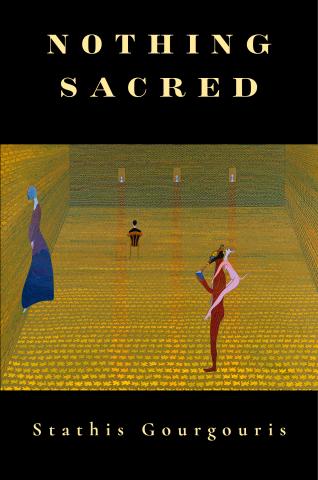Published
Columbia University Press
Nothing Sacred makes a bold call for reconceptualizing the projects of humanism and democracy as creative sources of emancipatory meaning, from the immediate political sphere to the farthest reaches of planetary ways of living.
Restaging Aristotle’s classic notion of the “political animal” in broad historical and geographical frames, Stathis Gourgouris explores the autopoietic capacities of human-being in society, while developing new frameworks of anticolonial humanism and radical democracy as the only worthy adversaries of neoliberal capitalism.
This reconfigured anthropological horizon enables us to imagine new ways of living by learning to pursue a radical politics of autonomy and a planetary vision that upholds life-affirming coexistence and equal sharing against the fetishism of hierarchy and servitude, money and technologic, sovereignty and endless growth.
Written with daring, erudition, and anarchic contestation, this book seeks the political through a poetic perspective. Nothing Sacred rejects niche thinking in the academy and engages a vast domain of reflections on the problem of human-being in today’s dismal world.
------------
Enlightenment thought is widely considered to consist of four key features--atheism, democracy, humanism, and modernity. Common to all is an explicit process of desacralization. Yet the intellectual history of these concepts reveals that in the process of desacralization new sacred spaces arose in their name. The aim of Nothing Sacred is to question this second-order sacralization and consider, in a form of negative dialectics, whether (and how) these domains can argue against themselves in order to once again desacralize their own self-sacralization.
Secular critique is not simply an attack on religion but rather on the range of society's unavowed self-occlusions. Its object is to elucidate the politics and practices of knowledge that animate them. In the field of religion critique challenges the alleged permanence of political theology and transforms the epistemologies of both sacred and secular.
For Stathis Gourgouris the state of nature that he terms political animality critiques political theology much as the anarchy of democracy, inhabited by it, critiques sovereignty. He takes aim at the desacralizing capacity of these historical formations, which produce their own historical conditions for self-sacralization, in order to demonstrate their dynamic subversive power against deeply ensconced conditions of disempowerment and incapacitation and to understand how societies and individuals are driven to self-subversion and self-disempowerment.
These forces are alive today in the form of discursive "posts"--posthumanism, postdemocracy, post-truth, postracial--which are just as self-sacralizing. Exposing them is not a nostalgic liberal return to an idealized past but an expansive anarchic ontological affirmation of the political dimensions of human animality on a planetary scale and of a radical politics in which democracy has severed its bind to capitalism.
Nothing Sacred thinks across orders, obstacles, and intersectional spaces in a world of warring multipolar oligarchies and psychotic rage.
ENDORSEMENTS
If, as Adorno contended, history does intrude on every word, if it withholds each word from the recovery of some alleged original meaning, it is incumbent upon us to attend to each and every word we use with exacting attention. No one I read these days foregrounds, indeed, rethinks words, the most demanding words, with the unflinching attention, with the capacious erudition and the poetic creation, demanded and exemplified by Stathis Gourgouris. Thus, with human-being, Gourgouris attends to the intrusive and withholding history of animality, race, and technology; with democracy, to that of anarchy and finitude, of violence and tragedy, of capitalism; and with the sacred—Gourgouris tarries for effect—nothing. This is a formidable book.
Gil Anidjar, Columbia University
Nothing Sacred shows the virtue and necessity of secular criticism and the substantial gifts it can provide. In elegant prose that is profoundly reflective on the constituents of life and thought, Stathis Gourgouris investigates the most complex problems of our time and how they came to be. This book stands out for its display of the innovative critical thinking that is essential to escape epistemological and practical political impasse.
Paul A. Bové, Distinguished Professor Emeritus, University of Pittsburgh
At once nuanced, profoundly learned, and passionate, Gourgouris deftly extends his dazzling local analyses across the disciplines of politics and theology, literary and art criticism, psychoanalysis and feminism, anthropology and cybernetics. His rethinking of the basic assumptions underpinning settled conceptualizations will set the understanding of humanism and democracy on an entirely new basis.
Donald E. Pease, Ted and Helen Geisel Third Century Professor in the Humanities, Dartmouth College
TABLE OF CONTENTS
Preface
- Humanism, Human/Animal, Human-Being
Rethinking humanism—Edward Said’s non-humanist humanism—The legacy of anti-colonial humanism—Humanism as an open question—Three phrases of history (Marx, Heidegger, Benjamin)—A digression on the digression of the animal—Three tropes of human animality: psychē, paideia, philia—No more artificial anthropisms
- Democracy’s Anarchy
Anarchy is the archē of democracy—Archē and finitude—Democracy is the regime of the living—The constituent violence of democracy: the liberal closure—The constituent violence of democracy: the anarchist opening—Democracy is a tragic regime—No democracy without dissent—Surplus over nothing—Notes on left governmentality
Coda: Against the Politics of the Sacred
